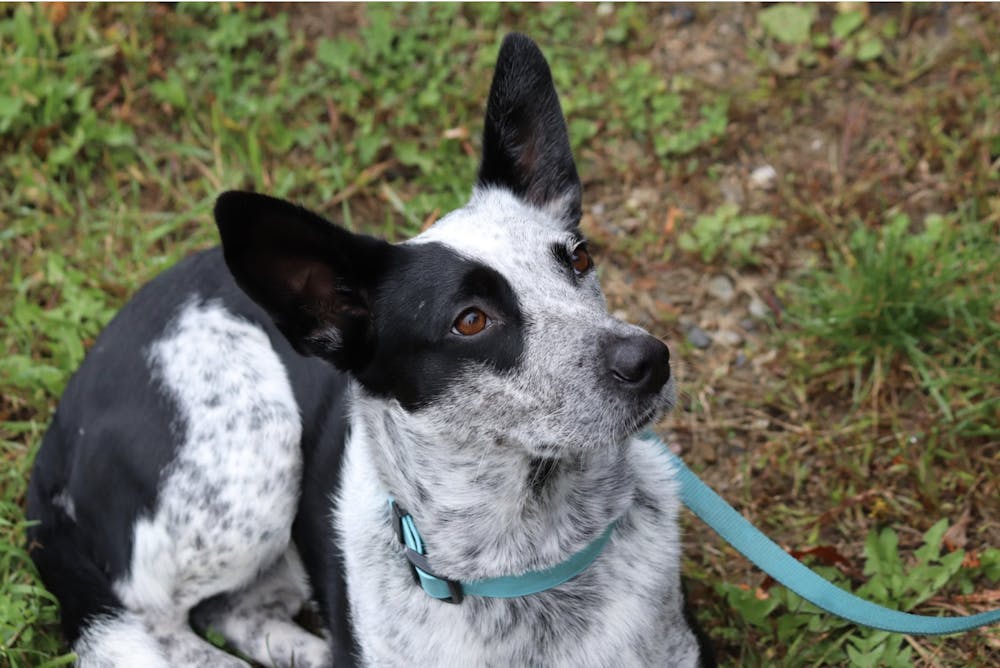Counseling Services at the Center for Health and Wellness (CHW) welcomed a new member last August, Stella the therapy dog, with plans to give students regular access to a therapy animal.
Since receiving approval to come to campus three weeks ago, Stella has made appearances at the college’s flu and Covid-19 vaccination clinics. Stella’s handler, Associate Director of the CHW Sarah Lawrence, is looking forward to integrating Stella into many Counseling Services offerings, from individual and group counseling sessions to open-access events.
“I think the emphasis for Stella for me is to have her accessible to all students, whether they’re a part of counseling or not,” Lawrence said.
She added that some students, for various reasons, may not want to interact with Stella and that the CHW is being very mindful of making sure those students are not put in uncomfortable situations.
Both Lawrence and Barbara McCall, executive director of the CHW, emphasized that Stella had undergone extensive training and certification to do her job. She needed tests of trustworthiness and obedience, letters of recommendation, a letter from her veterinarian and a letter by Lawrence stating why she wanted to get Stella certified.
“It takes a lot of work on the owner's end, to go through the process and keep up the pieces,” Lawrence said.
McCall said that the difficult process was a big part of why it was hard for the CHW to have a regular therapy animal. The fact that Stella has been added was primarily due to Lawrence wanting to get Stella certified independent of the CHW.
“All animals can provide therapeutic experiences, but not all of them are specially trained to do that,” McCall said. “And we’ve been waiting for the opportunity to have someone who’s certified to come in and do it.”
Though the CHW did not directly consult students in the initial decision-making process, McCall expressed that they had known for a long time that students wanted more access to therapy animals. “It felt like a no-brainer,” McCall said.
Some students who spoke with The Campus were unaware of Stella’s presence but expressed excitement about having a therapy dog on campus.
“I hadn’t heard of this, so I’m excited to take advantage of it,” Maria Gutierrez Delgado ’26 said. “Even if it’s not a necessity, I think it’s a great addition to counseling resources.”
The CHW will pay special attention to students’ opinions on how they integrate Stella into their services. Since Stella is the first regular therapy dog on campus, the integration process is in its pilot phase, making it all the more important to listen to feedback, McCall added.
The CHW is also new, having formed due to offices that specialize in different areas of student health coming together in the last years. It includes Health Services, Counseling, Health and Wellness Education (HWE), Sports Medicine and Integrated Care, a new office working with students who have complex health pictures.
“We don’t bill students, it’s all included in the comprehensive fee, students don’t know that sometimes,” McCall said.
Services by counseling include individual and group counseling sessions, outreach-based services and Let’s Talk, which is a new program for students to drop in for 25-minute consultations, no appointment needed.
“[Let’s Talk] is kind of counseling-lite,” Lawrence said, adding that it is something she did at another university previously, and that it can be an easier entrance into counseling. She mentioned that she’s looking forward to incorporating Stella there as well.
McCall and Lawrence said they would love to incorporate other therapy animals in the office, but the process would have to be initiated by a staff member.
“It's a deeply personal decision,” McCall said. “It's really about us, waiting for someone who wants to do that, and then talking about opportunities for collaboration or integration, versus the other way around, getting people to do the work of getting a therapy dog, training them and bringing them.”




